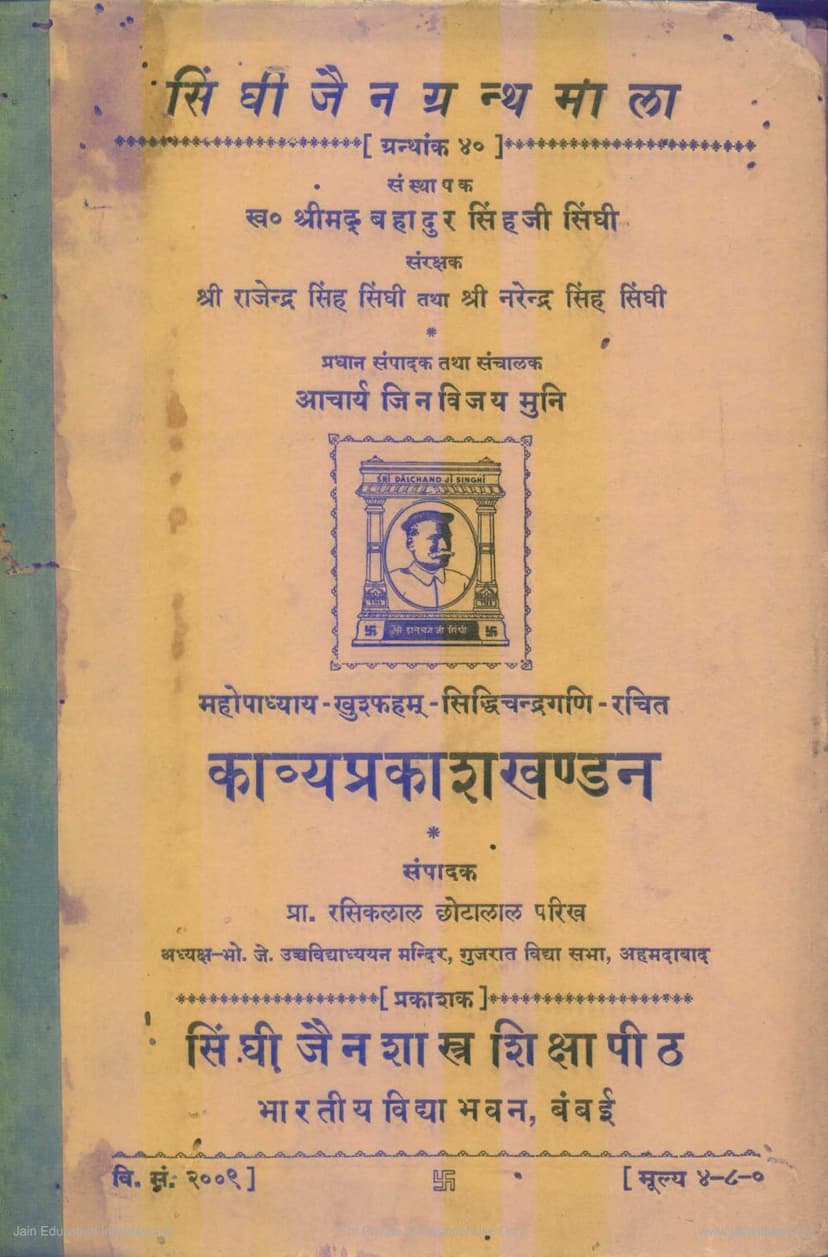Kavya Prakasha Khandana
Added to library: September 2, 2025

Summary
Here's a comprehensive summary of the Jain text "Kavyaprakasha Khandana" by Siddhi Chandra Gani, based on the provided information:
Book Title: Kavyaprakasha Khandana (A Critique of some of the Topics of Mammata's Kavyaprakasha)
Author: Mahopadhyay Khushfaham Siddhi Chandra Gani
Publisher: Singhi Jain Shastra Shiksha Pith, Mumbai (Published in the Singhi Jain Series, Vol. 40)
First Edition: 1953 AD (Vikram Samvat 2009)
Overview:
"Kavyaprakasha Khandana" is a critical work by the renowned Jain scholar Mahopadhyay Siddhi Chandra Gani. It serves as a detailed critique and analysis of specific concepts and theories presented in "Kavyaprakasha," a highly influential work on Sanskrit poetics by the Kashmiri scholar Mammata. Siddhi Chandra Gani, a prominent Jain philosopher and literary figure, undertakes this critique from a distinctly Jain philosophical and literary perspective.
Key Aspects and Content:
-
Critical Engagement with Mammata's Kavyaprakasha: The central purpose of this text is to examine and, where necessary, challenge or refine certain doctrines and explanations found in Mammata's "Kavyaprakasha." Siddhi Chandra Gani doesn't aim to refute the entire work but rather focuses on specific points of contention or areas where his own understanding, possibly influenced by Jain traditions, differs.
-
Jain Scholarly Tradition: The work highlights the engagement of Jain scholars with non-Jain classical literature. Siddhi Chandra Gani's critique demonstrates that Jain monks and scholars were not only deeply immersed in their own religious and philosophical texts but also critically studied and commented upon prominent works from other Indian traditions, including Sanskrit poetics.
-
Focus of Criticism: Siddhi Chandra Gani engages with various aspects of poetics as discussed by Mammata. This includes:
- Definition of Poetry (Kavya): He scrutinizes Mammata's definition and likely offers alternative perspectives, possibly aligning with Jain notions of literature's purpose.
- Dosas (Defects) in Poetry: A significant portion of the work is dedicated to analyzing and critiquing Mammata's classification and understanding of poetic defects, often re-categorizing them or suggesting different interpretations based on sound principles of grammar, logic, and aesthetics.
- Alamkaras (Figures of Speech): Siddhi Chandra Gani delves into the classification and nature of various figures of speech, analyzing their mechanisms and offering his interpretations, sometimes suggesting inclusion of certain figures within broader categories or clarifying their distinctiveness.
- Rasa (Aesthetic Emotion): The work likely engages with Mammata's theories on Rasa, including its number, nature, and experience, potentially from a philosophical standpoint that emphasizes the ultimate spiritual purpose of literature or art.
- Vyanjana (Suggestion/Implication): He critically examines the concept of Vyanjana, a key element in Mammata's theory, possibly debating its nature, scope, and relationship with other linguistic functions.
-
Methodology: Siddhi Chandra Gani's approach is characterized by meticulous analysis and argumentation. He often explains the original concept from Mammata's "Kavyaprakasha" before presenting his critique. His arguments are rooted in linguistic precision, philosophical reasoning, and an understanding of aesthetic principles. The text suggests he also refers to and refutes the interpretations of other commentators on "Kavyaprakasha."
-
Contribution to Poetics: This work contributes to the discourse on Sanskrit poetics by introducing a Jain perspective on established theories. It enriches the understanding of these concepts by offering alternative interpretations and highlighting the analytical rigor of Jain scholars.
-
Significance of the Singhi Jain Series: The publication of this text under the Singhi Jain Series underscores the commitment of the Singhi family and the Singhi Jain Shastra Shiksha Pith to preserving and promoting Jain literature and scholarship. The memorial tribute to Babu Shri Bahadur Singh Singhi, the patron of the series, highlights his deep appreciation for scholarship and his role in supporting such valuable publications.
In essence, "Kavyaprakasha Khandana" stands as a testament to Siddhi Chandra Gani's profound erudition and his critical engagement with the foundational texts of Indian literary theory, offering a valuable addition to the study of Sanskrit poetics from a Jain scholarly viewpoint.